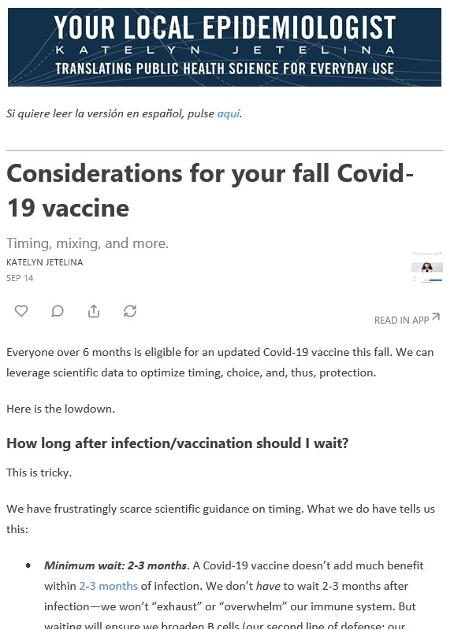Considerations for your fall Covid-19 vaccine Timing, mixing, and more. KATELYN JETELINA SEP 14, 2023
Everyone over 6 months is eligible for an updated Covid-19 vaccine this fall. We can leverage scientific data to optimize timing, choice, and, thus, protection.
To view the graphics and charts that go with the text below please go to:
yourlocalepidemiologist.sub...
-
Here is the lowdown.
How long after infection/vaccination should I wait?
This is tricky.
We have frustratingly scarce scientific guidance on timing. What we do have tells us this:
Minimum wait: 2-3 months. A Covid-19 vaccine doesn’t add much benefit within 2-3 months of infection. We don’t have to wait 2-3 months after infection—we won’t “exhaust” or “overwhelm” our immune system. But waiting will ensure we broaden B cells (our second line of defense; our antibody factory that stores some long-term-memory). With an updated vaccine formula, we want our factory updated.
--
Maximum wait 8-12 months: The longer we wait, the more we get out of the vaccine. One study found that waiting 8 months increased neutralizing antibodies 11 times more than waiting 3 months after infection. Another study found a 12-month interval improved vaccine effectiveness against hospitalization.
-
BUT waiting is a gamble. Even if a vaccine sooner is not as good as it could be, it’s better than waiting too long and catching Covid with limited protection, especially for high-risk people.
SO, this is what I’m suggesting to my family:
Over 65 or at risk for severe disease: Get vaccine 4 months after infection/previous vaccine. Don’t wait more than 6 months. (Go here to understand why older adults need more urgent protection.)
Under 65 and not high risk: Wait at least 6 months. Ideally, get vaccinated once a winter wave starts taking off. (Getting it by Halloween is a good bet.) This is what I will be doing with my family. But remember, we have very little/no protection against infection until we do. So, other layers of protection are especially needed.
-
Do I wait for Novavax?
There is some evidence that mixing Novavax with mRNA is better and some evidence that staying with mRNA is better. It’s a bit hard to know which one is “right.”
High-risk people: The data pool is so narrow I’m uncomfortable suggesting that high-risk people wait for Novavax; we don’t know if it’s immunologically better. So don’t wait for this option if it’s been >6 months since your last vaccine and/or infection.
-
Other reasons people may want to wait on Novavax:
Side effects. The mRNA vaccines are the most reactogenic vaccines we’ve ever had (i.e., a lot of side effects). They kick my butt, so I will be waiting for it.
-
Hesitant about mRNA biotechnology.
What about mixing the mRNA vaccines?
If you’ve only had an entire Moderna series, you may see marginal benefit from getting a Pfizer bivalent booster (and vice versa). But, to be honest, the science is mixed and isn’t very strong. So just get the vaccine that is most easily accessible.
-
What about mixing with the flu vaccine?
You can get the flu vaccine (and other routine vaccines) and the Covid-19 vaccine at the same visit. It’s recommended to get them in different arms.
There have been studies on the safety and effectiveness of the co-administration of these two vaccines. In one database, about 454,000 people got the flu and Covid-19 vaccines. Both worked great. The rate of side effects was the same or a little higher among those that co-administered; however, no specific safety concerns were identified.
-
(CDC) Under 5 years old and not yet vaccinated for Covid-19
I’m getting a ton of questions from parents whose kids have yet to be vaccinated for Covid-19. First, I’m glad you’re taking this step—it will help protect against severe disease and reduce the duration of illness and transmission.
I agree that guidance is confusing, but I found this CDC slide helpful:
Your unvaccinated younger child (<5 years) needs more doses than, for example, an older child because they are more likely to be immune naive (i.e., never have had this virus). Multiple shots the first time ensure the immune system creates a durable memory.
-
Bottom line
Fall is here. Our priority is preventing severe disease among high-risk people, and we can be smart about it. But if this feels too much like gymnastics, get your shot before Halloween. It will help you and those around you.
-
Love, YLE
“Your Local Epidemiologist (YLE)” is written by Dr. Katelyn Jetelina, M.P.H. Ph.D.—an epidemiologist, wife, and mom of two little girls. During the day, she is a senior scientific consultant to several organizations. At night, she writes this newsletter. Her main goal is to “translate” the ever-evolving public health world so that people will be well-equipped to make evidence-based decisions. This newsletter is free, thanks to the generous support of fellow YLE community members
